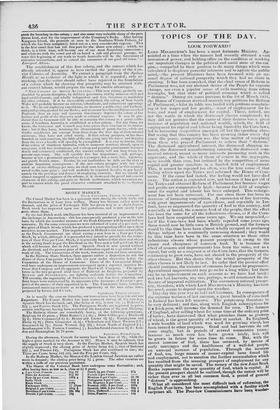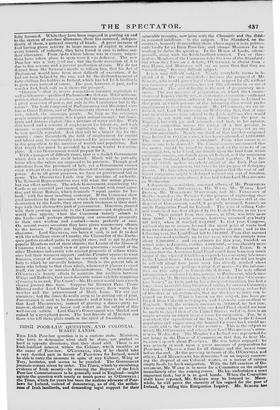TOPICS OF THE DAY.
LOOK FORWARD LORD MELBOURNE'S has been it most fortunate Ministry. Ap- pointed at a time when the masses had recently obtained a vast accession of power, and holding office on the condition of working out important changes in the political and social state of the cm pire,—compelled by their position to do many things whielt were calculated to displease powerful interests and to agitate the public mind,—the present Ministers have been Favoured with an un- usual degree of national prosperity which they had no share in creating. It has been remarked, that the chief cause of Reform in Parliament was, not any abstract desire of the People for organic change, nor even a popular sense of evils resulting from rotten boroughs, but that state of political economy which is called " distress." During six years previous to the hat of March 18:31, the House of Commons received scareely any petitions for Reform of Parliament, u hilst its table was loaded with petitions complain- ing of low wages and low prolits,—want of employment lot la- bour, and want of employment for capital. : These, indeed, are not the words in which the distressed classes complained; for they did not perceive that the cause of their distress was a great increase of population and national wealth, which, the field (A' employment for capind and labour being limited by the Corn-laws, led to harassing competition amongst all but the spending class. But seeing that this country has been growing richer every day since the peace, cotnpetil ion was the true matter of complaint from those who prayed Parliament to relieve their " distress." The distressed agricultural interest, the distressed shipping in-• terest, the distressed manufacturing interest, the distressed cone- • mereial interest, meant so many interests possessing each in the aggregate, and the whole of them of course in the apgregate, more wealth than ever, but irritated by the competition of more capital and greater numbers in a limited field of employment. This, it cannot be repeated too often, \VW; the true cause of that feeling which upset the Tories and reformed the House of Com- mons. If the cause had lasted, the feeling would not have died away. The nation is contented now, not because it has got rid of the Tories and obtained Reform of Parliament, but because wages and profits are comparatively high—because the field of employ- ment for capital and labour has been enlarged. This enlarge- ment has not been universal. For one class there has been no decrease of harassing competition. A succession of fine harvests, with great improvements of agriculture, and especially in Ire- land, have so augmented the quantity of food in this country, and especially of bread, the common food of the people, that the effect has been the same for all the industrious classes, as if the Corn- laws had been suspended some years ago. We say suspended,— for if the Corn-laws had been wholly repealed some years ago, there would now be little corn in British ground, and the fitrmers would by this time have been almost wholly occupied in producing things subject to a continually increasing demand; they would by this time have been in the same situation as those other industrious classes whose present prosperity is owing to the plenty and cheapness of common food. It is because the effect of seasons and improvements has been the same, not as a repeal, but only as a suspensiat of the Corn-laws, that the farmers, continuing to grow corn, have not shared in the prosperity of the other classes. But this shows that the actual prosperity of the other classes is not likely to last. In order that the present effect should continue, the increase of common food must be progressive. Agricultural improvements may go on for a long while; but there can be no improvement on such seasons as we have had lately; and two bad harvests, nay one, perhaps, would counteract the in- fluence of improved cultivation. The uncommon national prospe- rity, therefore, with which Lottl M-81.noURNE'S Ministry has been favoured, scents to depend upon the weather. May-day this year was as cola as Christmas. In consequence of the extreme wetness of last autumn, a great breadth of corn-land in Ireland has been left unsown. The potato-crop threatens to be very deficient ; and this, along with English subscriptions for tle Irish poor, will increase the demand for corn. The farmers cf England, after selling wheat for some time at the ordinary price cf barley, have discovered that what punishes them as growers of wheat, is the great quantity of wheat at market. In England, a wide breadth of land which was used for growing wheat, has been turned to other purposes. Good and bad harvests do not come singly, but in periods of several consecutive years: because so much corn has been grown lately, less will be grown in future for some time to come. But, with the recent increase of food, there has occurred, by means of early marriages and the healthiness of a well-fed people, an unusual increase of population. Through the increase of food, too, large masses of money-capital have found life and employment, not to mention the -further accumulation which has resulted from the seeming prospect of employment for any quantity that might be saved. The money of the, new Joint Stock Banks represents the new quantity of food, which is capital. If the present prospect should be realized, though the nation will be richer than ever in all but common food, a period of general "distress" is approaching.
What all considered the most difficult task of reforming, the English Poor-laws, has been accomplished with a facility which surprises all. The Poor-law Commissioners have been wonder-
fully favoured. While they have been engaged in putting an end to the system of out-door allowance, there has occurred, indepen- dently of them, a general scarcity of hands. A great increase of
food having given activity to large masses of capital in almost every branch of industry, they have found it easy to refuse out-
door allowance. From spots where labour was in excess, migra- tions have taken place to spots were it was deficient. The new Poor-law was a very good one; but the facile execution of it is due to fine seasons and a greater production °learn. We do not detract from Mr. SENIOR'S merits in telling him, that his Aet of Parliament would have been most difficult of execution, if he had not been helped by the sun, and by the disfranchisement of forty-shilling freeholders in Ireland, which has led Irish landlords to grow corn instead of voters. The past, however. is past, and is worth a look back only as it shows the prespeet.
"Distress"—that is, severe competition amongst capitalists as well as labeurers—produced Parliamentary Rehm'''. What will man-
petition, that is, distress, produce, now that the MaSSI'S have obtained
a greet micession of power, not only in the Legislature but in the towns? The body romposed of Parliamentary and Municipal elec- tors in Great Britain, and of Parliamentary electors in Ireland, are now, indeed, the sovereign people. So long as the sovereign people remains prosperous, it is a quiet animel enough ; but &net- craev and distress explode like a mixture of water and fire. With dear bread and a scarcity of employment far labcaneirs, and with ruinous cempetition amongst capitalists, the C'erulaws will be very quickly repealed. Awl that will be a bright day for this
country ; since thenceforth the field of employment for capital and labour may be continual y increased for generations to come
in due proportion to the increase of wealth and population. But that bright day must be preceded by a storm fearful to contem- plate. A eise Government would prepare for it. With a prospect of difficult times, that is a foolish Government which does not render itself beloved. Much will be patiently borne when the rulers are supposed to be patriotic. Though good intentions form the pavement of hell, yet a Government cannot exist without them when popular discontent accompanies popular power. As to all great purposes, we have no government but in name. The Obstructive Lords stop the machine of authority. The National Representatives may will what the nation pleases, but can effect nothing. The whole Government, considering the Lords as an essential part thereof, treats Ireland with cruel injus- tice, and Great Britain, which demands " equal justice for Ire- land," with the most insulting contempt. If the Commons show good intentions by the measures which they carefully prepare fir destruction by the Lords, they show much weakness in their deal- ings with that obstructive part of government. Ministers, pleased with their growing majority in the Commons—not displeased, it would also appear, when the Commons tamely submit to the Lords—and perhaps attributing our economical prosperity to their own wisdom and conduct—seem perfectly at ease. On several recent occasions they have given unnecessary offence to the masses. People are beginning to pick holes in their
character. Lord GLENELG, one hears it said, is not fit to deal with the rebellious state of Canada; the Chancellor of the Exche-
quer prefers crooked paths to straight ones, and is apt to jockey popular Members out of their objects; the Leader of' the Douse of Commons takes a small view of great questions ; several of the other Ministers indecently vote against proposals of reform which
once had their warmest support; and the Premier appears to want firmness, except of manner, in his contests with the aristocratic
body to which Ile naturally belongs. Such is the present talk of ninny who belong to that class %vine'', whenever it pleases to exert itself, can make or unmake Administrations. Notwithstanding
O'CONNELL'S hearty ellbrts to maintain the coalition between Whigs and Radicals, that most desirable union exhibits symptoms
of coming to an end. Time Court !—Mr. II lingoes would have a much
shorter journey this time. Suppose Sir ROBERT PEEL Prime Minister under Lord Chancellor Lveromeuuse; then watch the weather and the price-current of Mark Lane. We are not-
alartnists ; but the times do really seem to be getting out of joint. Fore-warned is said to be fore-armed : and it were to be wished
that Lord MELBOURNE, instead of gracing a dinner-party to- morrow, should stay at home and reflect on the subject of this well-meant article. Lord GREY'S Government was blinded and ruined by a sycophant press. The best friends of Ministers are those who tell there plain truth in the spirit of friendship.



























 Previous page
Previous page